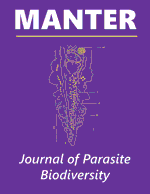Parasitology, Harold W. Manter Laboratory of

MANTER: Journal of Parasite Biodiversity
ORCID IDs
Date of this Version
11-5-2022
Document Type
Article
Citation
MANTER: Journal of Parasite Biodiversity (November 7, 2022) number 22
doi: 10.32873/unl.dc.manter22
Abstract
The emerging infectious disease (EID) crisis represents an immediate existential threat to modern humanity. Current policies aimed at coping with the EID crisis are ineffective and unsustainably expensive. They have failed because they are based on a scientific paradigm that produced the parasite paradox. The Stockholm paradigm (SP) resolves the paradox by integrating four elements of evolutionary biology: ecological fitting, sloppy fitness space, coevolution, and responses to environmental perturbations. It explains why and how the EID crisis occurs and is expanding and what happens after an EID emerges that sets the stage for future EIDs. The SP provides a number of critical insights for changing scientific and public policy in a manner that allows us to begin coping with the EID crisis in an effective manner. It provides hope that we can anticipate EIDs and prevent them or at least mitigate their impacts.
This article has been produced in support of and with appreciation for the efforts by Gábor Földvári of the Institute of Evolution, Centre for Ecological Research, and the Centre for Eco-Epidemiology, National Laboratory for Health Security (both located at 1121 Budapest, Konkoly-Thege Miklós út 29-33, Hungary). Through his untiring efforts, team building, and leadership, he has secured the first EU-wide team research grant. This work was supported by the National Research, Development and Innovation Office in Hungary (RRF-2.3.1-21-2022-00006) and the COST Action CA21170 “Prevention, anticipation and mitigation of tick-borne disease risk applying the DAMA protocol (PRAGMATICK),” which represent the first funded efforts to apply the principles of the DAMA protocol.


Comments
Copyright © 2022, Brooks, Boeger, Hoberg
License: Creative Commons Attribution-NonCommercial-ShareAlike 4.0 International